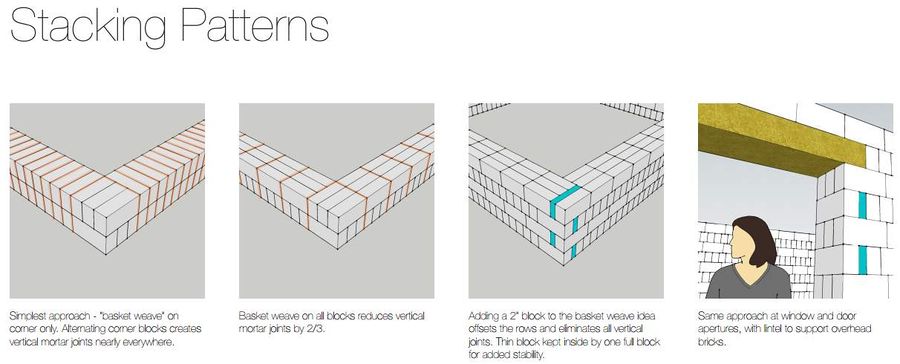Brick Stacking Patterns: Difference between revisions
Jump to navigation
Jump to search
No edit summary |
(→Review) |
||
| Line 2: | Line 2: | ||
=Review= | =Review= | ||
Marcin suggests simplest approach in House Module 1, with corners being Basket Weave. For Doors and Windows - I suggest a modified 'Basket Weave with middle brick missing - because if bricks are slightly over 4" in some cases, we will have trouble. | Marcin suggests simplest approach in House Module 1, with corners being Basket Weave. However, we should add the 2" spacer here to address this. | ||
For Doors and Windows - I suggest a modified 'Basket Weave with middle brick missing - because if bricks are slightly over 4" in some cases, we will have trouble. | |||
I suggest avoiding bricks over the lintels found over windows and doors - replacing these with a bond beam instead. This avoids the interfacing details on top of wood. I suggest frames for doors and windows are put in before bricks are laid around these apertures so we do all brick laying with no velocity decrease due to apertures. | I suggest avoiding bricks over the lintels found over windows and doors - replacing these with a bond beam instead. This avoids the interfacing details on top of wood. I suggest frames for doors and windows are put in before bricks are laid around these apertures so we do all brick laying with no velocity decrease due to apertures. | ||
Revision as of 16:41, 26 July 2013
Review
Marcin suggests simplest approach in House Module 1, with corners being Basket Weave. However, we should add the 2" spacer here to address this.
For Doors and Windows - I suggest a modified 'Basket Weave with middle brick missing - because if bricks are slightly over 4" in some cases, we will have trouble.
I suggest avoiding bricks over the lintels found over windows and doors - replacing these with a bond beam instead. This avoids the interfacing details on top of wood. I suggest frames for doors and windows are put in before bricks are laid around these apertures so we do all brick laying with no velocity decrease due to apertures.
